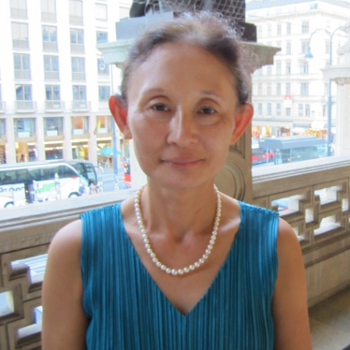Leipzig Opera’s Die Walküre production is full of dark and brooding anxiety. Hunding’s hut was a claustrophobic basement room reached from the ground via a spiral staircase. The low ceiling heightened the oppressive atmosphere. Siegmund and Sieglinde’s budding love was not so much a union of two young hearts as a desperate attempt by bleeding hearts at emancipation. When Siegmund sang of the spring chasing away the winter storm, the back wall of the room opened up to reveal the outside in dark blue hue, not an inviting warm place.
The Wotan family’s residence in Act 2 was no longer the opulent hall of Das Rheingold. The two side walls had collapsed at an angle, and a large chimney-like structure took up the center of the room, diminishing its size. Wotan and Fricka’s dress, hair and general appearance reminded me of Wagner and his wife Cosima. The central wall lifted to open up the stage for the death announcing scene and the battle between Siegmund and Hunding. Lighting remained dark and gloomy.
Act 3 took place in what looked like a collapsed Colosseum with a slanted, paneled wall on one side and a round recessed floor. A small platform was placed off-center. The front of the stage was cluttered with many pairs of short white boots, presumably signifying the dead heroes. The smoky blue hue continued to dominate the stage, while Wotan appeared wearing a long blue coat. The Valkyries were dressed in khaki-colored skirts and pants, some with jackets and carrying rifles, like Hunding.
Dancers acted as Fricka’s lamb and Wotan’s ravens, some patiently lying on the floor during Act 2 to remove props. Each Valkyrie was accompanied by a dancer clad in a white flying outfit and helmet, signifying a horse. Brunnhilde was shadowed constantly by a male dancer dressed as Grane. As she was laid for sleep, a figure dressed as Loge appeared to light the fire around the platform.
Ulf Schirmer and the Gewandhaus Orchestra were on excellent form. The slow tempo of Act 1 (clocking in at 70 minutes) befit the gloomy atmosphere of the production, with each rumbling of drums predicting the stormy conflict to come. The dark timbre of the instruments was emphasized, with cellos, basses horns and tuba being prominent. The tempo picked up in Act 2, the orchestra propelling the action of this crucial part of the Ring drama, as Wotan’s scheme to save the gods begins to unravel. The orchestra playing was tight and focused. In Act 3, as if to signal a new phase of the drama and with Brunnhilde embarking on her mission to save the world, Schirmer turned up the volume to bring out the excitement of the Walküre war cries. The brass ensemble was glorious, giving us the hint of the hero to come. The tempo and volume both became subdued and ended in lingering hush as Wotan bade farewell to Brunnhilde as she was surrounded by the magic fire. At this point, I wished that the audience would have held a few more seconds of silence after the music slowly disappeared before they began their enthusiastic applause.
Singing was of high quality, with Thomas Johannes Mayer’s Wotan full of anger and frustration well matched by Iréne Theorin’s fiery and commanding Brunnhilde. The two veterans impressed with their ability to sing the punishing roles with endurance and to sing softly at times, and demonstrated admirable musicality to match their tone with the underlying orchestra. Simone Schneider’s voice may not have the purity and brightness for Sieglinde, but her impressive chest voice combined with secure high notes made her a moving and strong woman, not a weak victim. The veteran Simon O’Neill’s Siegmund was thrilling and heroic, his cries for “Walse” seemed to go on forever. Kathryn Göring’s Fricka and Runi Brattaberg’s Hunding rounded out the strong cast. The eight Walküre women all sang and acted with power and excitement, although they may have benefited from one more round of rehearsals.
The director Rosamund Gilmore has given us an ironic and humorous Das Rheingold, followed by a Die Walküre of angst and foreboding. The last two installments of the Leipzig Ring hold promise of more surprise and excitement.




